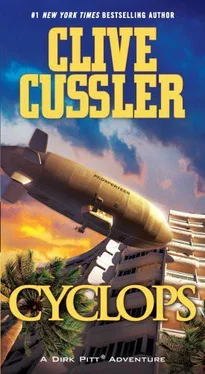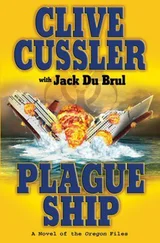"I'll personally be on hand to meet him."
"Good. Take him by helicopter to CIA headquarters in Langley. Martin Brogan and representatives from my office and the State Department will be waiting to debrief him."
"He may not be able to shed light on anything."
"You're probably right," said the President wearily. "I'm expecting too much. I guess I always expect too much."
He hung up and sighed heavily. He collected his thoughts for a moment and then shelved them in a mental niche for later retrieval, a technique mastered sooner or later by every President. Shifting the mind from crisis to trivial routine and back again to crisis like the flick of alight switch was a requirement that went with the job.
Fawcett knew the President's every mood and patiently waited. Finally he said, "It might not be a bad idea if I attended the debriefing."
The President looked up at him sadly. "You'll be going with me to Camp David at sunup."
Fawcett looked blank. "I have nothing on your schedule that includes a trip to Camp David. Most of the morning is taken up by meetings with congressional leaders over the proposed budget."
"They will have to wait. I have a more important conference tomorrow.
"As your chief of staff may I ask who you're conferring with?"
"A group of men who call themselves the `inner core.' "
Fawcett stared at the President, his mouth slowly tightening. "I don't understand."
"You should, Dan. You're one of them."
Before a dazed Fawcett could reply, the President left the office and rejoined the dinner party.
<<42>>
The thump of the landing wheels woke Pitt up. Outside the twin-engined Navy jet the sky was still dark. Through a small window he could see the first streaks of orange spearheading the new day.
The blisters caused by the friction from the bathtub made sitting almost impossible, and he had slept in a cramped position on his side. He felt generally awful, and he was thirsty for something besides the fruit juices forced down his stomach in endless quantities by an overly concerned doctor on the submarine.
He wondered what he would do if he ever met up with Foss Gly again. Whatever fiendish punishment he created in his mind didn't seem excessive enough. The thought of the agony Gly was inflicting on Jessie, Giordino, and Gunn haunted him. He felt guilty for having escaped.
The whine of the jet engines faded and the door was opened. He walked stiffly down the stairs and was embraced by Sandecker. The admiral rarely shook hands, and the unexpected display of affection surprised Pitt.
"I guess what they say about a bad penny is true," said Sandecker hoarsely, groping for words.
"Better to turn up than not," Pitt replied, smiling.
Sandecker took him by the arm and led him over to a waiting car. "They're waiting at CIA headquarters in Langley to question you."
Pitt suddenly stopped. "They're alive," he announced briefly.
"Alive?" said Sandecker, stunned. "All of them?"
"Imprisoned by the Russians and tortured by a defector."
Incomprehension showed on Sandecker's face. "You were in Cuba?"
"On one of the outer islands," Pitt explained. "We've got to apprise the Russians of my rescue as quickly as possible to stop them from--"
"Slow down," Sandecker interrupted. "I'm losing you. Better yet, wait and tell the whole story when we get to Langley. I suspect you may have fallen in the creek and come up with a pocketful of trout."
On the flight across the city it began to rain. Pitt gazed through the plexiglass windshield at the 219 wooded acres surrounding the sprawling gray marble and concrete structure that was the home of America's cloak-and-dagger army. From the air it seemed deserted, no people were visible on the grounds. Even the parking lot was only one quarter full. The only human shape Pitt could detect was a statue of the nation's most famous spy, Nathan Hale, who had made the mistake of getting caught and was hanged.
Two senior officials were waiting at the helipad with umbrellas. Everyone hurried into the building, and Pitt and Sandecker were shown into a large conference room. There were six men and one woman present. Martin Brogan came over and shook Pitt's hand and introduced the others. Pitt simply nodded and promptly forgot their names.
Brogan said, "I hear you've had a rough trip."
"Not one I'd recommend to tourists," Pitt replied.
"Can I get you something to eat or drink?" Brogan offered graciously. "A cup of coffee or breakfast maybe?"
"If you could find a bottle of cold beer. . ."
"Of course." Brogan picked up the phone and said something. "Be here in a minute."
The conference room was plain by business-office standards. The walls were a neutral beige color, the carpet the same, and the furniture looked as though it came from a discount store. No pictures, no decorations of any kind gave it life. A room whose only function was to serve as a place to work.
Pitt was offered a chair at one end of the table, but declined. His rear end did not feel up to sitting just yet. Every eye in the room stared at him, and he began to feel like an inmate at the zoo on a Sunday afternoon.
Brogan gave him a relaxed smile. "Please tell us everything you've heard and observed from the beginning. Your account will be recorded and transcribed. Afterward, we'll go for questions and answers. All right with you?"
The beer came. Pitt took a long pull, relaxed, and then started relating the events from the takeoff in Key West to elatedly seeing the submarine rise out of the water a few yards from his sinking tub. He left out nothing and took his time, going into every detail, no matter how minor, he could recall. It took him nearly an hour and a half, but they listened attentively without question or interruption. When he finally finished, he gently eased his aching body into a chair and calmly watched everyone check over their notes.
Brogan declared a short break while aerial photographs of Cayo Santa Maria, files on Velikov and Gly, and the copies of the transcription were brought in. After forty minutes of study, Brogan kicked off the questioning.
"You carried weapons in the blimp. Why?"
"Projections of the Cyclops' wreck site indicated it lay in Cuban waters. It seemed appropriate to carry a bulletproof shield and a missile launcher for protective insurance."
"You realize, of course, your unwarranted attack on the Cuban patrol helicopter was a breach of government policy." This from a man Pitt remembered as working for the State Department.
"I followed a higher law," said Pitt with a sardonic grin.
"And what law, may I ask, is that?"
"Comes from the Old West, something they called self-preservation. The Cubans fired first, about a thousand rounds, I would judge, before Al Giordino blew it away."
Brogan smiled. He could see Pitt was a man after his own heart. "Our main concern here is with your description of the Russians' installation on the island. You say the island is unguarded."
"Above ground the only guards I saw were stationed at the gate of the compound. None were patrolling the roads or the beaches. The only security measure was an electrified fence."
"That explains why infrared photography hasn't detected any signs of human activity," said an analyst eyeballing the photos.
"Unlike the Russians to step out of character," mused another CIA official. "They almost always give away a secret base by going overboard on security."
"Not this time," said Pitt. "They've gone to opposite extremes and it's paid off for them. General Velikov stated that it was the most sensitive military installation outside the Soviet Union. And I gather that no one in your agency was aware of it until now."
"I admit, we may have been taken in," said Brogan. "Providing what you've described to us is true."
Читать дальше












